Kenneth L. Gentry Jr.'s Blog, page 96
August 23, 2016
IRAN’S CHURCH IN TWO SENTENCES
 PMT 2016-062 by Mark Howard
PMT 2016-062 by Mark Howard
(The Gospel Coalition)
Ken Gentry note: The gospel is the power of God unto salvation. Even among Muslims. Despite persecution Christianity is growing in Islamic lands, as postmillennialism would expect. In a time of decline of the church in America, it is encouraging to see its strengthening under the most grueling circumstances in Muslim countries. Pray for the church in the Middle East.
Everyone loves a good story. As Christians, we especially love stories that tell us how, when all seems lost, God makes a way.
One such story is about the church in Iran—and it’s one of the greatest stories in the world today.
It’s a simple story that can be summarized in just two sentences: Persecution threatened to wipe out Iran’s tiny church. Instead, the church in Iran has become the fastest growing in the world, and it is influencing the region for Christ.
As simple as it is, such an amazing story is worth examining deeper.
Growth Amid Persecution
The Iranian revolution of 1979 established a hard-line Islamic regime. Over the next two decades, Christians faced increasing opposition and persecution: All missionaries were kicked out, evangelism was outlawed, Bibles in Persian were banned and soon became scarce, and several pastors were killed. The church came under tremendous pressure. Many feared the small Iranian church would soon wither away and die.
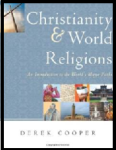
Christianity and the World Religions:
By Derek CooperCooper. Examines the rival worldviews found in Hinduism, Buddhism, Confucianism and Taoism, Judaism, Islam, and irreligion. He engages these worldviews from a Christian perspective.
See more study materials: www.KennethGentry.com
But the exact opposite has happened. Despite continued hostility from the late 1970s until now, Iranians have become the Muslim people most open to the gospel in the Middle East.
How did this happen? Two factors have contributed to this openness. First, violence in the name of Islam has caused widespread disillusionment with the regime and led many Iranians to question their beliefs. Second, many Iranian Christians have continued to boldly and faithfully tell others about Christ, in the face of persecution.
As a result, more Iranians have become Christians in the last 20 years than in the previous 13 centuries put together since Islam came to Iran. In 1979, there were an estimated 500 Christians from a Muslim background in Iran. Today, there are hundreds of thousands—some say more than 1 million. Whatever the exact number, many Iranians are turning to Jesus as Lord and Savior.
In fact, last year the mission research organization Operation World named Iran as having the fastest-growing evangelical church in the world. According to the same organization, the second-fastest growing church is in Afghanistan—and Afghans are being reached in part by Iranians, since their languages are similar.
Three Changed Lives
The testimonies of Iranian men and women who’ve come to Christ are powerful.
Kamran was a violent man who used to sell drugs and weapons. One day, a friend gave him a New Testament. After reading for five consecutive days, Kamran gave his life to Jesus. When his family and friends saw his transformed life over the ensuing months, many of them also came to faith. A church now meets in Kamran’s house.
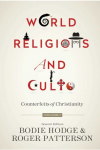
World Religions and Cults (Bodie Hodge, ed.)
This work is helpful for understanding and combating false religions and cults. It deals with the leading false religious beliefs in the world today.
See more study materials at: www.KennethGentry.com
Reza was a mullah (a Muslim scholar) who hoped to become an ayatollah (a Shiite leader). One day, while studying at an Islamic seminary in Iran, he found a New Testament that had been boldly left in the library. Out of curiosity, he picked it up and was deeply shaken. Over time, he fell in love with Jesus. Today Reza is a trained church planter serving in the Iran region.
Fatemah’s earliest memories were of being raped by her brothers. At age 11, she was sold in marriage to a young drug addict who abused her and then divorced her when she was 17. Upon returning home she was raped again, until she decided to leave. On the streets she heard the gospel preached, and she trusted Jesus. In time, she married a Christian man. As they were receiving training in evangelism and church planting, Fatemah felt called to go back home and witness to her family. Her entire family repented and gave their lives to the Lord. The first church Fatemah and her husband planted was in her childhood home.
I’ve had the privilege of hearing Kamran, Reza, and Fatemah share their stories. I’ve heard countless other testimonies that are equally remarkable. Each one is a painful and yet marvelous celebration of the gospel’s beauty. Each one is a powerful reminder that despite trials and persecution-perhaps because of the suffering-the gospel of Jesus shines and the church of Jesus grows.
Story God Is Writing
We’re living in a time when many Christians are suffering for their faith, particularly in Islamic contexts. People often react by preaching fear and hatred of the Muslim world. Yet the apostle Paul reminds us that we are to “rejoice in hope, be patient in tribulation, be constant in prayer” (Rom. 12:12). This is our call.
To continue reading:
https://www.thegospelcoalition.org/article/the-story-of-the-irans-church-in-two-sentences

Mark Howard works with Elam Ministries, an organization founded in 1990 by Iranian church leaders with a mission to strengthen and expand the church in the Iran region and beyond. Mark also serves on the advisory board of Rooted and has a chapter in Gospel-Centered Youth Ministry (Crossway, 2016).








August 19, 2016
GRASSROOTS POLITICS OF POSTMILLENNIALISM (3)
 PMT 2016-061 by J. Vaden Cavett
PMT 2016-061 by J. Vaden Cavett
Gentry note: This article was originally published in The Covenant Quarterly and is used by permission of the author. We are in a political season which requires that we bring our faith to bear upon this important topic. This is part 3 of a three part series.
A Radically New Creation
Scripture doesn’t leave us wondering what things will be like when the earth is “filled with the knowledge of the glory of the Lord, as the waters cover the sea.” (Habakkuk 2:14).
In Isaiah 2, the Lord promises “that the mountain of the Lord’s house shall be established in the top of the mountains, and shall be exalted above the hills; and all nations shall flow unto it. And many people shall go and say, Come ye, and let us go up to the mountain of the Lord, to the house of the God of Jacob; and he will teach us of his ways, and we will walk in his paths: for out of Zion shall go forth the law, and the word of the Lord from Jerusalem. And he shall judge among the nations, and shall rebuke many people: and they shall beat their swords into plowshares, and their spears into pruninghooks: nation shall not lift up sword against nation, neither shall they learn war any more.” (Isaiah 2:2-4) The Lord’s law will go forth, and the people shall give themselves willingly to the Lord in the day of his power (Psalm 110:3).
Wall of Misconception: Separation of Church and State
(by Peter Lillback)
Examines our nation’s historic understanding of and the founding fathers
intention in the relationship of our Constitution to matters of faith, ethics, and morals,
taking into account the historical and biblical context as well as
the concept s relation to today’s culture.
See more study materials at: www.KennethGentry.com
The result of Christ’s reign is peace, which is only fitting for a kingdom ruled by the Prince of Peace. The entire created order is renewed under the Lordship of Christ: “The wolf also shall dwell with the lamb, and the leopard shall lie down with the kid; and the calf and the young lion and the fatling together; and a little child shall lead them. And the cow and the bear shall feed; their young ones shall lie down together: and the lion shall eat straw like the ox. And the sucking child shall play on the hole of the asp, and the weaned child shall put his hand on the cockatrice’ den. They shall not hurt nor destroy in all my holy mountain: for the earth shall be full of the knowledge of the Lord, as the waters cover the sea. And in that day there shall be a root of Jesse, which shall stand for an ensign of the people; to it shall the Gentiles seek: and his rest shall be glorious.” (Isaiah 11:6-10)
My Argument Summarized… Again
To summarize once more:
• God blesses nations in response to their obedience to His commands.
• The promise of the New Covenant is God’s promise to give His people new hearts and the gift of His Holy Spirit.
• New Hearts and the indwelling Holy Spirit always result in obedience.
• This obedience results in the national blessings enumerated in Deuteronomy 28 (teach all “nations” – the great commission focuses on nations, not just individuals).
Scripture promises Christ will have dominion over the whole earth in history, prior to His second coming.
A world filled with Christ-honoring nations, obedient to God’s law, is nothing short of a New Creation.
Our Responsibility
“People who expect the world to end very soon, and are planning on being raptured out of it, are not likely to be concerned about dominion over the earth, nor the application of God’s law to the whole of life. Moreover, if such people believe, as they do, that Satan rules the world, they will regard their responsibilities to the world as negligible, and the world as something to escape from.” (Rushdoony, God’s Plan for Victory)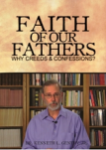
Faith of Our Fathers (DVDs by Ken Gentry)
Explains the point of creeds for those not familiar with their rationale.
Also defends their biblical warrant and practical usefulness.
See more study materials at: www.KennethGentry.com
So what’s our responsibility in regards to the Kingdom?
Pray – Pray “Thy kingdom come. Thy will be done in earth, as it is in heaven.” (Matthew 6:10)
Obey – “And thou shalt love the Lord thy God with all thine heart, and with all thy soul, and with all thy might. And these words, which I command thee this day, shall be in thine heart: And thou shalt teach them diligently unto thy children, and shalt talk of them when thou sittest in thine house, and when thou walkest by the way, and when thou liest down, and when thou risest up.” (Deuteronomy 6:5-7)
Nurture Your Children – “And, ye fathers, provoke not your children to wrath: but bring them up in the nurture and admonition of the Lord.” (Ephesians 6:4)
This may not seem like much, but consider this: A father and mother have five children; each of those children has five children; each of those grandchildren has five children; etc. By the fifth generation, the father and mother who started the whole thing have affected 625 lives. Parenting is frontline Kingdom work; don’t let anyone tell you differently.
Evangelize – “Go ye therefore, and teach all nations, baptizing them in the name of the Father, and of the Son, and of the Holy Ghost: Teaching them to observe all things whatsoever I have commanded you: and, lo, I am with you alway, even unto the end of the world. Amen.” (Matthew 28:19-20)

Jonathan Cavett is a writer and instructional designer at an alternative finance company. He is co-founder of TheCovenantHerald.com and their newsletter, The Covenant Quarterly.








August 16, 2016
GRASSROOTS POLITICS OF POSTMILLENNIALISM (2)
 PMT 2016-060 by J. Vaden Cavett
PMT 2016-060 by J. Vaden Cavett
Gentry note: This article was originally published in The Covenant Quarterly and is used by permission of the author. We are in a political season which requires that we bring our faith to bear upon this important topic. This is part 2 of a three part series.
Kingdom Progress in History
R. J. Rushdoony writes: “The heart of post-millennialism is the faith that Christ will through His people accomplish and put into force the glorious prophecies of Isaiah and all the Scriptures, that He shall overcome all His enemies through His covenant people, and that He shall exercise His power and Kingdom in all the world and over all men and nations, so that, whether in faith or in defeat, every knee shall bow to Him and every tongue shall confess God (Rom. 14: 11; Phil. 2: 11).” (God’s Plan for Victory)
To summarize my argument:
• God blesses nations in response to their obedience to His commands.
• The promise of the New Covenant is God’s promise to give His people new hearts and the gift of His Holy Spirit.
• New Hearts and the indwelling Holy Spirit always result in obedience.
• This obedience results in the national blessings enumerated in Deuteronomy 28 (teach all “nations” – the great commission focuses on nations, not just individuals).
When God promised the New Covenant, He was promising more than a free offer for all to go to heaven. He was promising a New Creation (Isaiah 65:17-25). But how do we get from prosperous Christian nations to an entirely New Creation?
The New Creation is inaugurated in Christ’s resurrection and consummated at His second coming, but in the intervening period, the Kingdom, Christ’s area of influence – his dominion – will spread throughout the whole earth: “Of the increase of his government and peace there shall be no end, upon the throne of David, and upon his kingdom, to order it, and to establish it with judgment and with justice from henceforth even for ever. The zeal of the Lord of hosts will perform this.” (Isaiah 9:7)
Christ’s expanding dominion and the cultural advances it results in is nothing like humanism’s impersonal view of evolutionary progress. Christ’s reign is personal: “For he must reign, till he hath put all enemies under his feet. The last enemy that shall be destroyed is death.” (1 Corinthians 15:25-26)
Saving Freedom
(by Sen. Jim DeMint)
(Former) Senator DeMint’s firsthand account of the unsettling socialist shift—behind-the-scenes actions in Congress that are changing the character of our nation.
See more study materials at: www.KennethGentry.com
As Christ has dominion, He subdues the inheritance the Father has already given to Him: “I will declare the decree: the Lord hath said unto me, Thou art my Son; this day have I begotten thee. Ask of me, and I shall give thee the heathen for thine inheritance, and the uttermost parts of the earth for thy possession.” (Psalms 2:7-8) We know Christ did ask this of the Father, and we know the Father granted His request. How do we know this? Because, after the resurrection, just before He gives His apostles the Great Commission, Christ tells His disciples, “All power is given unto me in heaven and in earth.” (Matthew 28:18)
The whole earth is Christ’s domain, so His domain does not expand its borders – it cannot: He owns everything. However, Christ still has work to do. From now until His second coming, Christ will exercise dominion on earth and expand His influence. That’s why we pray: “Thy kingdom come. Thy will be done in earth, as it is in heaven.” (Matthew 6:10)
In Daniel 2, the Kingdom of God is a stone, cut out of the mountain without hands (44, 45). This Kingdom will “never be destroyed: and the kingdom shall not be left to other people, but it shall break in pieces and consume all these kingdoms, and it shall stand for ever.” (Daniel 2:44) We see this conquering Christ in Revelation 19, consuming nations with the Gospel: “And I saw heaven opened, and behold a white horse; and he that sat upon him was called Faithful and True, and in righteousness he doth judge and make war…. And out of his mouth goeth a sharp sword, that with it he should smite the nations: and he shall rule them with a rod of iron: and he treadeth the winepress of the fierceness and wrath of Almighty God. And he hath on his vesture and on his thigh a name written, KING OF KINGS, AND Lord OF LORDS.” (Revelation 19:11-16)
Secret Thoughts of an Unlikely Convert
(by Rosaria Butterfield)
Remarkable testimony of a lesbian professor who was a leading spokesperson for
the feminist movement, but whom Christ saved.
See more study materials at: www.KennethGentry.com
The influence of the Kingdom in history is pervasive. It was relatively minuscule when the King walked on Earth, but He promised it would grow: “The kingdom of heaven is like to a grain of mustard seed, which a man took, and sowed in his field: Which indeed is the least of all seeds: but when it is grown, it is the greatest among herbs, and becometh a tree, so that the birds of the air come and lodge in the branches thereof. Another parable spake he unto them; The kingdom of heaven is like unto leaven, which a woman took, and hid in three measures of meal, till the whole was leavened.” (Matthew 13:31-33) As surely as a mustard seed grows large or leaven leavens an entire lump, the Kingdom of God, the influence of King Jesus, will permeate history.
To be continued…

Jonathan Cavett is a writer and instructional designer at an alternative finance company. He is co-founder of TheCovenantHerald.com and their newsletter, The Covenant Quarterly.








August 12, 2016
GRASSROOTS POLITICS OF POSTMILLENNIALISM (1)
 PMT 2016-059 by J. Vaden Cavett
PMT 2016-059 by J. Vaden Cavett
Gentry note: This article was originally published in The Covenant Quarterly and is used by permission of the author. We are in a political season which requires that we bring our faith to bear upon this important topic. This is part 1 of a three part series.
Before we begin, just know this article is unique. It is a systematic presentation of the Bible texts relevant to the topic of the Kingdom, and it contains very few of my own words. Volumes and volumes have been written on this subject, most of which you can find online for free.
My main purpose for writing this article is to summarize, from Scripture, how God will transform the world under the scepter of King Jesus. To start that discussion, we must begin with the tools by which redeemed man exercises dominion.
The Tools of Dominion
“God has a plan for the conquest of all things by His covenant people. That plan is His law. It leaves no area of life and activity untouched, and it predestines victory. To deny the law is to deny God and His plan for victory.” (God’s Plan for Victory, R.J. Rushdoony)
In Deuteronomy 28, God tells Israel she will be a prosperous nation if she keeps the law of the Lord: “And it shall come to pass, if thou shalt hearken diligently unto the voice of the Lord thy God, to observe and to do all his commandments which I command thee this day, that the Lord thy God will set thee on high above all nations of the earth….” (Deuteronomy 28:1; cf. vv. 2-14)
The national blessings God pours out in response to obedience to His law includes fruitful wombs, fruitful fields, fruitful livestock, financial and physical security, and success in military campaigns (though the blessing is voided if the campaign is unlawful or unjust).
Political Christianity (book)
(by Christian Citizen)
Christian principles applied to practical political issues, including “lesser-of-evils” voting.
See more study materials at: www.KennethGentry.com
One characteristic blessing of obedient nations is particularly haunting in light of our national debt: “The Lord shall open unto thee his good treasure, the heaven to give the rain unto thy land in his season, and to bless all the work of thine hand: and thou shalt lend unto many nations, and thou shalt not borrow.” (Deuteronomy ?28:12?) America’s debt, among other things, is the direct result of us rejecting Christ as King.
How do nations become obedient and receive these blessings? Heart regeneration.
The Promise of the New Covenant
The Lord gives Israel a precious promise in Ezekiel 36: “For I will take you from among the heathen, and gather you out of all countries, and will bring you into your own land. Then will I sprinkle clean water upon you, and ye shall be clean: from all your filthiness, and from all your idols, will I cleanse you. A new heart also will I give you, and a new spirit will I put within you: and I will take away the stony heart out of your flesh, and I will give you an heart of flesh. And I will put my spirit within you, and cause you to walk in my statutes, and ye shall keep my judgments, and do them.” (vv. 24-27)
After driving His rebellious people into exile, the Lord promises to gather them from the nations and bless them. This gathering is the work we are called to in the Great Commission. We’re sent to gather all God’s elect into the New Jerusalem, the Church.
The Church is commanded: “Go ye therefore, and teach all nations, baptizing them in the name of the Father, and of the Son, and of the Holy Ghost: Teaching them to observe all things whatsoever I have commanded you: and, lo, I am with you alway, even unto the end of the world. Amen.” (Matthew 28:19-20)
The second part of the command, “baptizing them in the name of the Father, and of the Son, and of the Holy Ghost”, is the fulfillment of God’s promise to “sprinkle clean water upon you, and ye shall be clean: from all your filthiness, and from all your idols, will I cleanse you.”
Prodigal Press: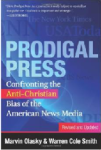
Confronting the Anti-Christian Bias of the American News Media
By Marvin Olasky and Warren Cole Smith
Issuing a clarion call for Christians to reclaim American journalism, Olasky and Smith examine the influence of worldviews on reporting, objectivity, sensationalism, and crusading; the impact of legal, ethical, and technological changes; and the changes brought about by the 24/7 news cycle, the Internet, and social media.
See more study materials at: www.KennethGentry.com
This sprinkling (notice the mode of baptism is sprinkling, not immersion) removes our filth, and as we read in Hebrews 10:22, purifies our consciences: “Let us draw near with a true heart in full assurance of faith, having our hearts sprinkled from an evil conscience, and our bodies washed with pure water.”
This sprinkling is nothing short of the baptism of the Holy Spirit: “But after that the kindness and love of God our Saviour toward man appeared, Not by works of righteousness which we have done, but according to his mercy he saved us, by the washing of regeneration, and renewing of the Holy Ghost….” (Titus 3:4-5) This is exactly what the Lord promises will happen: “A new heart also will I give you, and a new spirit will I put within you: and I will take away the stony heart out of your flesh, and I will give you an heart of flesh. And I will put my spirit within you.”
At Pentecost, Peter proclaims this promise to the crowd gathered in Jerusalem: “Then Peter said unto them, Repent, and be baptized every one of you in the name of Jesus Christ for the remission of sins, and ye shall receive the gift of the Holy Ghost. For the promise is unto you, and to your children, and to all that are afar off, even as many as the Lord our God shall call.” (Acts 2:38-39) At that moment, everyone knew, God was keeping His promise.
The Result of Regeneration
What’s the result of the Great Commission and of heart regeneration? Obedience. “And I will put my spirit within you, and cause you to walk in my statutes, and ye shall keep my judgments, and do them.”
Paul, writing after Pentecost, says much the same thing: “For what the law could not do, in that it was weak through the flesh, God sending his own Son in the likeness of sinful flesh, and for sin, condemned sin in the flesh: That the righteousness of the law might be fulfilled in us, who walk not after the flesh, but after the Spirit.” (Romans 8:3-4) Spiritual renewal and heart regeneration always result in obedience to God’s commands. Which ones? The ones Israel knew about, God’s statutes and judgments, the Ten Commandments and all their applications.
To be continued…

Jonathan Cavett is a writer and instructional designer at an alternative finance company. He is co-founder of TheCovenantHerald.com and their newsletter, The Covenant Quarterly.








August 9, 2016
THE SEXUAL REVOLUTION AND THE WITNESS OF THE CHURCH
 PMT 2016-058 by Albert Mohler, Jr.
PMT 2016-058 by Albert Mohler, Jr.
Gentry note:
The following article from Tabletalk magazine presents the challenge that is before the Church of Jesus Christ. We must pray for revival in the Church that she might arise and re-ignite the progress she promoted in years past. Postmillennialists are not naive: we recognize the downward trend we are currently experiencing. But we remain optimistic for the historical long-run: our God is in heaven and:
“He who sits in the heavens laughs, / The Lord scoffs at them. / Then He will speak to them in His anger / And terrify them in His fury, saying, /‘But as for Me, I have installed My King /Upon Zion, My holy mountain.” (Psa. 2:4–6)
However, Christians today need to be reminded: he uses his people in history to effect his will. This is why he has given us this prayer to pray publically, corporately, and believingly: “’Your kingdom come. Your will be done, / On earth as it is in heaven” (Matt. 6:10).
The Sexual Revolution and the Witness of the Church
In the face of the sexual revolution, the Christian church in the West now faces a set of moral challenges that exceeds anything it has experienced in the past. This is a revolution of ideas-one that is transforming the entire moral structure of meaning and life. These challenges would be vexing enough for any generation. But the contours of our current challenge have to be understood over against the affecting reality for virtually everything on the American landscape, and furthermore in the West. This revolution, like all revolutions, takes few prisoners. In other words, it demands total acceptance of its revolutionary claims and the affirmation of its aims. This is the problem that now confronts Christians who are committed to faithfulness to the Bible as the Word of God and to the gospel as the only message of salvation.
The scale and scope of this challenge are made clear in an argument made by the British theologian Theo Hobson. As Hobson acknowledges, “Churches have always faced difficult moral issues and they have muddled through.” Some will argue that the challenge of the sexual revolution and the normalization of homosexuality are nothing new or unusual. He says, “Until quite recently I would have agreed,” but he also says, “It becomes ever clearer that the issue of homosexuality really is different.”
The Beast of Revelation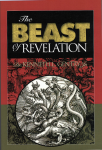
by Ken Gentry
A popularly written antidote to dispensational sensationalism and newspaper exegesis. Convincing biblical and historical evidence showing that the Beast was the Roman Emperor Nero Caesar, the first civil persecutor of the Church. The second half of the book shows Revelation’s date of writing, proving its composition as prior to the Fall of Jerusalem in A.D. 70. A thought-provoking treatment of a fascinating and confusing topic.
For more study materials, go to: KennethGentry.com
Why is this challenge to Christianity different? Hobson suggests that the first reason is what he recognizes as the either/or quality of the new morality. I agree with him that there is no middle ground in terms of the church’s engagement with these hard and urgent questions. Churches will either affirm the legitimacy of same-sex relationships and behaviors or they will not. And the churches that do not will take a stand on the basis of a claim that God has revealed a morality to His human creatures in holy Scripture.
The second factor that Hobson suggests is what he calls “the sheer speed of the homosexual cause’s success.” As he describes it: “Something that was assumed for centuries to be unspeakably immoral has emerged as an alternative form of life, an identity that merits legal protection. The demand for gay equality has basically ousted traditionalist sexual morality from the moral high ground.” This is a profoundly important point. Hobson is arguing that this revolution, unlike any other, has actually turned the tables on Christianity in Western civilization.
The Christian church has always enjoyed the moral high ground; it has always been understood to be the guardian of what is right and righteous, at least in Western societies. But what we are seeing now is a fundamental change. Hobson is arguing that this moral revolution, having turned the tables of Christianity, now robs the Christian church of the moral high ground it had previously claimed. The situation is fundamentally reversed. For the first time in the history of Western civilization, Christianity appears to be on the underside of morality, and those who hold to biblical teachings concerning human sexuality are now “ousted” (to use Hobson’s word) from the position of high moral ground.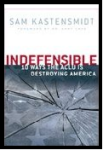
Indefensible (by Sam Kastensmidt)
Sub-title: 10 Ways the ACLU is Destroying America. An Important work in our day of cultural collapse and Christian persecution.
See more study materials at: www.KennethGentry.com
Hobson also rightly observes that this vast change in attitudes towards same-sex relationships and behaviors is not simply “the waning of the taboo.” As he explains:
It is not just a case of a practice losing its aura of immorality (as with premarital sex or illegitimacy). Instead, the case for homosexual equality takes the form of a moral crusade. Those who want to uphold the old attitude are not just dated moralists (as is the case with those who want to uphold the old attitude to premarital sex or illegitimacy). They are accused of moral defficiency. The old taboo surrounding this practice does not disappear but “bounces back” at those who seek to uphold it. Such a sharp turn-around is, I think, without parallel in moral history.
Hobson’s main point is that homosexuality “has the strange power to turn the moral tables.” And so what was previously understood to be immoral is now celebrated as a moral good. As a result, the Christian church’s historic teachings on homosexuality-shared by the vast majority of the citizens of the West until very recently-is now understood to be a relic of the past and a repressive force that must be eradicated.
To finish reading: http://www.ligonier.org/learn/articles/sexual-revolution-and-witness-church/
Dr. R. Albert Mohler Jr. is president of The Southern Baptist Theological Seminary in Louisville, Ky., a Ligonier teaching fellow and host of The Briefing. He is author of several books, including We Cannot Be Silent.








August 5, 2016
DEBATING HYPERPRETERISTS
 Every few years I will get a request such as this. I thought it might be helpful to answer it publicly so that in the next few years when I get another one, I can simply point to this article.
Every few years I will get a request such as this. I thought it might be helpful to answer it publicly so that in the next few years when I get another one, I can simply point to this article.
Dr. Gentry:
I have a friend who has pointed out problems he has with some of your response to HyperPreterism. He asked me these questions about you: Why do you not publicly debate HyperPreterists? And: In your chapter in Mathison’s book against HyperPreterism, you focus solely on the creedal argument. Does creedalism preclude exegesis?
LFR (North Carolina)
My response to questioner:
Thanks for your inquiry regarding my position as expressed in my chapter in Keith Mathison’s When Shall These Things Be? I generally make it a practice to avoid direct interaction with HyperPreterists for several reasons:
• According to a friend of mine, they have posted on one website prayer for my death. Why should I give them a portion of my life? Is that any way to conduct theological debate (outside of Islam, that is)?
• They tend to be rude, argumentative, and simplistic in interacting with others.
• They have difficulty understanding historic orthodox positions, such as their misconstruing what I am saying in my chapter in Mathison’s book.
When Shall These Things Be? A Reformed Response to Hyperpreterism
(ed. by Keith Mathison)
A reformed response to the aberrant HyperPreterist theolgy.
Gentry’s chapter critiques HyperPreterism from an historical and creedal perspective.
See more study materials at: www.KennethGentry.com
• They seem to have only one mission in life: to argue HyperPreterism. There are dozens of these folks constantly pushing HyperPreterism to the point of exhaustion.
• I actually had one of the prominent HyperPreterists come up to me at an American Vision seminar and tell my that the amillennialists have destroyed my orthodox preterist approach to Revelation 20. I explained to him that in my commentary I have a 10 page reply, but he insisted they have destroyed my view. I tried to inform this fellow that he hasn’t even seen my (as yet unpublished) analysis of the matter. But he continued on! I finally had to walk away.
• They don’t know when they have been bested. Joel McDurmon did a fine job in his debate on the topic, yet the HyperPreterist claims victory. They are a hard people to reach!
However, I do occasionally make an exception to cordially expressed inquiries (when I have time!). So I will answer your question as to whether my position in Mathison’s book entails the impossible and absurd position that “We must reject preterism before we can consider preterism.”
My response to the situation:
It is simply a naive and grandiose overstatement to say that I argue that Christians “must” reject HyperPreterism “before” they can consider it. After all, how would you know whether it should be rejected if you do not first consider it? Your friend’s argument simply does not make sense! Whoever your friend is, he is simply not thinking clearly if he surmises that I (and the other men in Mathison’s book) hold such an obscurantist position.
What is worse, your friend has grossly misread my chapter in Mathison’s book. And I would even suspect he has not read it at all (this problem is a constant frustration among many who have interacted with HyperPreterists: HPs too often fail to carefully analyze arguments). I do not argue as your friend thinks I do, as anyone reading my chapter should understand. Ironically, I have written hundreds of pages in numerous books arguing the exegetico-theological case for my eschatological views. I have only engaged the historico-creedal argument in a few places (Mathison’s book being the most voluminous and obvious case). In addition, I was asked to provide ONE chapter in a multi-chapter book which was to offer other arguments.
The Climax of the Book of Revelation (Rev 19-22)
Six lectures on six DVDs that introduce Revelation as a whole, then focuses on its glorious conclusion. Provides an important, lengthy Introduction to Revelation also.
See more study materials at: www.KennethGentry.com
Your friend should note that my chapter is replete with documentation from numerous Christian scholars regarding the role of creedal orthodoxy in framing the faith of the church. I cannot understand why your friend presents my position as if it is unique to me. In fact, some criticisms of my chapter have noted that I engage in documentary overkill by proving what everyone knows: Christianity has a long established a creedally-framed orthodoxy. I feel that I am caught between a rock and a hard head by such complaints.
The careful reader should note that in my “Introduction” on the second page of my presentation I forthrightly contradict your friend’s assertion. There I state: “We open with the creedal argument, not as the final word in the debate, but as the first word — not as our only concern, but as a crucial concern.”
Please note that I am simply setting the context of the debate: historic, Christian orthodoxy v. Nouveau unorthodoxy. I am opening the argument; I am not concluding it or closing it down. Orthodox Christians simply want unorthodox men to know where they are coming from. In fact, I did not even write the chapter for HyperPreterists, but for young Christians who may be subjected to the tempting lure of HyperPreterism: “Come, join with us: We are starting a New Reformation! Get in on the ground floor of a new church!” Sounds exciting. But the young Christian needs to realize what he is leaving behind if he succumbs.
Actually what I was saying was: The universal, historic, corporate Christian church has a biblically based, exegetically derived, systematically organized, clearly enunciated, publicly stated, creedally-secured, theology that affirms (for instance) a future, bodily resurrection and a future, visible Second Coming of Christ. Whether or not any individual wants to adopt the faith of our fathers is his own decision to make. What I argue in my chapter is: When a person adopts an historically unorthodox position he must understand that he is placing himself outside of the faith of the historic Christian church. HyperPreterists should simply declare: “We know what the historic Christian faith affirms, but we simply do not believe it and we do not care whether we are outside of orthodoxy.”
My chapter notes that by slipping loose from the anchor of historic orthodoxy, HyperPreterists are adrift on the tides of wholesale theological change. I note by way of introduction that many great doctrines of the faith are gradually being eroded by the relentless tides of hyper-preterist experimentation.
We all know that HyperPreterism is a new movement. I am simply calling upon Christians to recognize that it is new and potentially dangerous. In my “Conclusion” I state: “A critique of any new theological construct or religious movement must consider it on the basis of the historic creeds of orthodox Christianity as an important first step.” My chapter should not be interpreted to be the ONLY step in theological reflection; I expressly affirm the opposite position. I argue there that we must “get our bearings” and note our “theological orientation” as we move into a consideration of a new theology.
Click on the following images for more information on these studies:
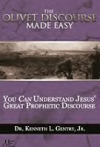

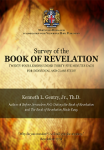








August 2, 2016
PROPERLY UNDERSTANDING OF POSTMILLENNIALISM
 PMT 2016-056 by Kenneth L. Gentry, Jr.
PMT 2016-056 by Kenneth L. Gentry, Jr.
Sadly, as the heat of the eschatological debate intensifies, too often the light from it diminishes. Postmillennialism is perhaps the easiest eschatological position to misunderstand in our era and therefore inadvertently to misrepresent. Consequently, we must remind our brothers in the debate of postmillennialism’s actual claims. In the Westminster Theological Journal article I caution non-postmillennialists regarding three faulty assumptions that they must avoid when responding to our eschatological system. And though few competent theologians would intentionally apply these conditions to postmillennialism, I fear that these sometimes lurk unrecognized in the subconscious.
First, postmillennialism neither teaches nor implies universalism. Postmillennialists do not argue that at some point in temporal history each and every individual then living will be saved. Consequently, even at the very height of the postmillennial advance, unbelievers will remain among us, though in a minority status—some as false converts to the faith, others as openly unrepentant resisters. Jesus clearly teaches this in his Parable of the Tares among the Wheat (Matt 13:30), just before declaring the enormous victory of the faith in all the world (Matt 13:31-33). This is a part of the “mysteries of the kingdom” (Matt 13:11): the glorious kingdom of God does not overwhelm the world catastrophically (but grows gradually like a mustard plant and penetrates little-by-little as does leaven) and it will not conquer the world absolutely (but grows to a majoritarian dominance like wheat in the field).
Getting the Message
(by Daniel Doriani)
Presents solid principles and clear examples of biblical interpretation.
See more study materials at: www.KennethGentry.com
Second, postmillennialism neither teaches nor implies perfectionism. Postmillennialists do not argue that at some point in temporal history Christians then living will be perfected. Despite the worldwide victory of the Christian faith, Christians will remain sinners—sanctified sinners, of course, but redeemed vessels of mercy suffering the complications of indwelling sin. Just as no current evangelical church is perfect, neither will an evangelical world be perfect. But if the majority of the human race were conducting themselves as the average church-going, born-again Christian of today, the world would certainly be a different and much better place—despite this lack of perfection.
Third, postmillennialism neither teaches nor implies satisfactionism. Postmillennialists do not argue that Christ’s people should prefer temporal, earthly conquest through gospel dominion over eternal, heavenly victory in consummational glory. Any believer with even a modicum of spiritual sanctification and biblical understanding must recognize the surpassing glory that awaits him in the resurrected estate. Then—and only then—will we see God face-to-face, experience the transformation of our bodies from mortality to immortality, enjoy freedom from temptation and sin, live forever in blessed circumstances, and be reunited with our saved loved ones. The glory of Christian dominion in the earth pales in comparison to the glory of resurrection majesty in the new earth.
Teaching for a Change
(by Norman De Jong)
Calls Christians to a biblical philosophy of education that deals with human nature, revealed truth,
and a child’s need to be transformed.
See more study materials at: www.KennethGentry.com
In addition to these three clarifications, postmillennialists endure dissenters reminding us of present world conditions as evidence against our expectations. Consequently, we must insist that our eschatological system be properly defined: nowhere in the definition of postmillennialism do we declare that by the year 2016 we will witness the glorious blessings of worldwide gospel conquest. Until the moment the Lord returns postmillennialism cannot be disproved by evidences from cultural decline and social chaos in the world. Who knows how long God will take to effect the glorious transformation? Just as Christians should not doubt the second coming of Christ because it has not occurred yet (2 Pet 3:4), neither should evangelicals discount the cultural dominion of Christ because it is not full now. All our system requires is that the world be Christianized before the Lord returns—and we do not know when that will be (Matt 24:36; Acts 1:7).








July 29, 2016
THE EFFECT OF RIGHTEOUSNESS
 PMT 2016-055 by Christopher Hume
PMT 2016-055 by Christopher Hume
Peace. It is illusive, yes, but it is not unattainable. The best of human rulers can only give thanks to God if his kingdom or country is characterized by peace. To say a kingdom is characterized by peace is a high commendation. For example, the reign of Israel’s greatest king, David, was characterized by peace (though not before much fighting had to be done; see 1 Chronicles 22:18; 23:25). Peace was even more prominent during Solomon’s days (1 Kings 4:20; 1 Chronicles 22:8). But the peace of King David and King Solomon was short-lived. As great as they were, these kings were still sinners. Imagine, however, a perfect king, ruling in perfect righteousness. What would be the effect of that? What would the result be if such a king were ruling over us? Would there be peace? Or would there be increasing wickedness and sin? The Bible not only answers that question, it also tells us who that king is.
In Isaiah 32 we are told, “Behold, a king shall reign in righteousness, and princes shall rule in judgment” (v. 1). One modern study Bible notes that this verse foreshadows the “triumph of the Messiah.” The Puritan Matthew Henry, a friend of all postmillennialists, notes that this passage directed the original readers “to look for the kingdom of Christ, and the times of reformation which that kingdom should introduce.” Every Christian will acknowledge that Jesus is King. However, the implications of this kingship are often overlooked. The Shorter Catechism specifically asks, “How doth Christ execute the office of a king” (Q. 26). The answer: “Christ executeth the office of a king, in subduing us to himself, in ruling and defending us, and in restraining and conquering all his and our enemies.” Some Christians are puzzled by this: if Christ is king, why is there still evil in the world? If Christ is on the throne, why are there still enemies at large? By looking to an Old Testament example of a king, we find instruction from God’s Word on how to view the kingship of Christ.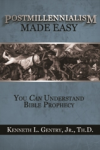
Postmillennialism Made Easy (by Ken Gentry)
Basic introduction to postmillennialism. Presents the essence of the postmillennial argument and answers the leading objections. And all in a succinct, introductory fashion.
See more study materials at: www.KennethGentry.com
Consider King David as a type of Christ. When David became king, he had a lot of work to do. In 1 Chronicles 11:3 we read, “And they anointed David king over Israel, according to the word of the LORD by Samuel.” In the very next verses, David leads his men against the Jebusites residing in Jerusalem. We see that immediately after the people of Israel anointed him as king, he fought against the Jebusites residing in Jerusalem (1 Chronicles 11:1-9). The fact that David had work to do did not diminish his kingship. Rather, the fact that he went to work subduing his enemies demonstrated his commitment to his role as king.
In like manner, the fact that Christ is in the process of bringing all things into subjection does not diminish his kingship at all. He is doing what all good kings do. He is building his kingdom. It is interesting to note as well that King David conquered the capital first-he struck a decisive blow right out of the gate (1 Chronicles 11:4). In a far greater way, Jesus Christ has already struck the decisive blow against the enemy. He has defeated (past tense) Satan. He “spoiled principalities and powers, he made a shew of them openly, triumphing over them in it [the cross]” (Colossians 2:15). There are those who deride the “triumphalism” of postmillennialism, but I am happy to rejoice in the victory of Christ. The work left to us is significant, but it is mop-up work nonetheless. We have much work to do as the King’s workers in rebuilding the foundations of family, church, and state. However, the great victory has been won. Our enemy has been defeated. Sure, Satan prowls around like a lion seeking someone to devour. But we can resist him. We can be sober-minded and watchful and rely upon King Jesus. With Christ on our side the enemy is nothing but a declawed kitten (cf. 1 John 4:4).
Despite the pockets of current resistance to his rule, the Kingdom of Christ has come-Christ is reigning as King now (1 Corinthians 15:25; Ephesians 1:20). The “time of reformation” occurred with the institution of the New Covenant and the ascension of Christ (Hebrews 9:10). Yes, the ultimate, final subjugation of all Christ’s enemies will occur when Christ destroys death itself (1 Corinthians 15:26)-but the course of history is one of progress until that point, not decline. The breaking-in of Christ’s kingdom has introduced times of reformation. The King is in the process of subduing his enemies. Just like King David did, Jesus is defeating the enemies of God. However, Jesus is the greater David-he is defeating greater enemies. Jesus is not simply conquering Israel-as David did-he is conquering the world (Psalm 2:8; Matthew 28:18-19). The enemies of the church are ideologically and spiritual. They are strongholds raised up against the knowledge of God (2 Corinthians 10:3-5). Christians are well-armed in this battle, despite what Satan wants us to think. Any good king provides his subjects with protection and resources. King Jesus provides his church with weapons “mighty through God” to wage the spiritual war against his enemies (2 Corinthians 10:4; cf. Ephesians 6:12-17). With the weapons of the Word, faith, and prayer, we can fight for our king to defeat anti-Christian ideologies and worldviews.
Thine Is the Kingdom
(ed. by Ken Gentry)
Contributors lay the scriptural foundation for a biblically-based, hope-filled postmillennial eschatology, while showing what it means to be postmillennial in the real world.
See more study materials at: www.KennethGentry.com
The righteous rule of Christ over earth does have tangible results. Isaiah said it long ago: “The work of righteousness shall be peace” (Isaiah 32:17). The idea is that a king reigning in righteousness will certainly cause peace. As the Kingdom grows, and enemies are defeated, people will be converted. What will be the result of individuals being saved? Well, for one, it will mean that more families will be saved (yes, salvation does come to households, see Luke 19:9). And what happens when more and more families are saved? For one thing, you begin to have communities that seek to serve Christ. And what happens when more and more communities are saved? You get the picture. Nothing in the Bible would lead us to believe that the inauguration of Christ’s kingdom leads to less righteousness in this world. On the contrary, all authority in heaven and on earth has been given to Christ and now he is going to use that authority to build his kingdom. Unless Jesus forgot to ask, all the nations of the earth will be given to him by the Father (Psalm 2:8).
Christ, not Satan, is King. If we have a righteous king over us (and you better believe Christ is a righteous king), what will the result be? Will it be ever-increasing wickedness and rebellion that leads to the church being a tiny remnant in the midst of a world of Christ-haters? Or will it be the steady spread of the Kingdom which the Bible speaks of (Matthew 13:31-33)? The effect of righteousness will be peace. The context of Isaiah 32 is that of the rule of a righteous king. That King is reigning now. If King David, a sinner, was able to defeat his enemies and promote peace, how much more will the perfect Son of God do so? As the Kingdom of Christ grows, peace will be enjoyed more not less. One of the biblical promises concerning the Kingdom of Christ is that nations will be at peace with one another: “Nation shall not lift up sword against nation, neither shall they learn war any more” (Isaiah 2:4). Does the righteous rule of Christ over all the nations actually produce peace? Yes, it most certainly does.
As an aside: What about our personal lives? Is the effect of serving a righteous King peace in our lives? As Dr. Bahnsen would ask, “How are things going in our neighborhood?” What is the effect of righteousness in your life? How are things going in my home? How are things going in my heart?
Thanks, Christopher, for your excellent article (Ken Gentry).
Christopher Hume holds the M.A. degree in Literature from Clarks Summit University. He enjoys reading Webster’s Dictionary of 1828 and listening to hour-long sermons on the biblical ethics of theonomy. He lives in eastern Pennsylvania with his one wife and four younglings. You can reach him at hume227@gmail.com
Click on the following images for more information on these studies:

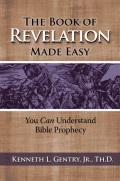
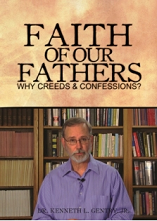








July 26, 2016
DOES REV 20 RESTATE REV 12 (2)?
 PMT-2016-54 by Kenneth L. Gentry, Jr.
PMT-2016-54 by Kenneth L. Gentry, Jr.
In my last article I introduced my rebuttal to the notion that Rev 20:1–3 (the binding of Satan) recapitulates Rev 12:7ff (Satan’s casting out of heaven). Recapitulation is a common feature within Revelation. But it does not appear everywhere that some think it does.
In this article I am continuing my response to G. K. Beale who argues for recapitulation on Rev 20:1–3. One’s approach to this question will influence his interpretation regarding a major figure in Revelation (Satan) and his judgment. I continue now with my fifth response to Beale.
(5) In 12:2 Satan rages with “great wrath because he knows he has little time.” Beale compares this with 20:3, where he is to be “released for a short time” after his confinement. But the point of 20:1–6 (the verses specifically mentioned by Beale) is that he is being confined (not exercising great wrath) and for “one thousand years” (not a “short time”). On the preterist view the “short time” Satan experiences in 12:2ff is the period of 1260 days of the Jewish War leading up to AD 70 (12:6, 13–14), which fits within Rev’s time constraints (1:1, 3; 20:6, 10).

As It Is Written: The Genesis Account Literal or Literary?
Book by Ken Gentry
Presents the exegetical evidence for Six-day Creation and against the Framework Hypothesis.
See more study materials at: www.KennethGentry.com
(6) Beale notes that Satan’s fall results in the coming of Christ’s kingdom with his saints (12:10–11), just as 20:4 shows Christ reigning with his saints. But this coming of the kingdom appears elsewhere in Rev, in that John is showing from different historical angles Christ’s victory — from his incarnation, death, resurrection, ascension, session, and all the way through to AD 70. Rev 1:6 (cp. 1:9; 5:10) declares that he has already “made” (epoiēsen, aor. act.) us a kingdom of priests before John writes, whereas in other places (as in 12:10–11 and 20:4) the kingdom appears to come later in the drama. For instance, 11:15 declares the kingdom comes — but without any reference to Satan’s fall and as a result of events occurring after Christ’s resurrection-ascension (11:15, cf. 11:7–12). Beale (587) points out that tthe Rev 11 episode occurs “when they [the two witnesses] should complete their witness,” which for him “is to occur at the end of history.” Whereas he sees the binding of Satan in 20:1–3 as occurring in the first-century victory of Christ: “the restraint of Satan is a direct result of Christ’s resurrection,” which “was probably inaugurated during Christ’s ministry” and “climactically put in motion immediately after Christ’s resurrection” (Beale 985).
This mixing of dramatic episodes is much like Christ’s own claims while on earth. For instance, he teaches that before his death and during his earthly ministry he was binding Satan (Mt 12:28–29),. Yet elsewhere he associates Satan’s demise with his resurrection-ascension (Jn 12:31–32; cp. Col 2:14–15; Heb 2:14; 1Jn 3:8). He does this regarding his kingdom’s coming also, noting that his casting out demons (a fall of Satan: Lk 10:17–18) demonstrates that the kingdom has come (Mt 12:28). But later he refers to AD 70 as “the kingdom of God” coming “with power” (Mk 9:1; cp. Mt 16:28). The complex of first redemptive-historical events (Christ’s life, death, resurrection, ascension, Pentecost, session, and AD 70) are all aspects of his grand victory. We may equally speak of Satan’s demise beginning in Christ’s ministry or at his resurrection. And as I will show, for dramatic purposes John presents AD 70 as its starting point. In that AD 70 stands as the concluding act of that first-century cluster of truths, and is the dramatic, historical evidence of them (Mk 9:1; cp. Mt 21:43; Ac 2:19–20), and is shortly to come to pass (1:1, 3), John effectively uses AD 70 as his collect-all since it is the final, climactic one.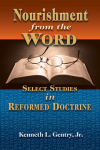
Nourishment from the Word
(by Ken Gentry)
Reformed studies covering baptism, creation, creeds, tongues, God’s law, apologetics, and Revelation
See more study materials at: www.KennethGentry.com
(7) Beale (992) observes that the saints’ kingship is “based not only on the fall of Satan and Christ’s victory but also on the saints’ faithfulness even to death in holding to ‘the word of their testimony’” (12:11; 20:4). John can speak of faithful adherence to the word and testimony in the first century as well as in the last century. In fact, John himself was in Patmos in the first century “because of the word of God and the testimony of Jesus” (1:9; cp. v 2).
I am convinced that Rev 20:1–3 does not recapitulate Rev 12:7ff. They are two distinct phases in God’s judgment of Satan.








July 22, 2016
DOES REV 20 RESTATE REV 12 (1)?
 PMT-2016-53 by Kenneth L. Gentry, Jr.
PMT-2016-53 by Kenneth L. Gentry, Jr.
Revelation is a powerful, intriguing, and confusing book. Some of the confusion arises from its internal structure. John often engages in recapitulation, that is, rehearsing earlier visions in later portions of his work. However, he does not always recapitulate his material.
One significant area of concern for proper interpretation involves the question as to whether Rev. 20:1–3 recapitulates Rev. 12:7ff regarding Satan’s judgment. Satan, of course, is a big player in Revelation’s drama, so this issue is a big question for the reader’s understanding. I will engage the matter in two articles. I hope you find these helpful to your interpretation of Revelation.
Contrary to the opinion of many, I do not believe that the vision in 12:7ff is restated in Rev 20:1–3 (as per Harrington 199; Aune 1078; Beale 992; Venema 320). Let me explain why, by considering and critiquing the evidence for re-capitulation.
When we read Rev 12 we see Satan being cast from heaven to the earth (12:9), with his angels (12:9), resulting in his furiously persecuting the saints for a short time (12:12, 14). Whereas in 20:1–3 we see Satan alone being cast from the earth into the abyss and being constrained from harming the saints — for a long time (see discussion at v 3). This in itself should quickly undermine the recapitulation argument in this text.
In fact, in 12:7ff Satan’s casting down to the earth results in his actively raising up the sea beast (13:1), who employs his own subordinate: the land beast. This sea beast engages in deception (13:14; 19:20), along with the harlot (18:23). But this is precisely the sort of activity Satan’s binding prevents, according to Rev 20:3: “he threw him into the abyss, and shut it and sealed it over him, so that he would not deceive the nations any longer, until the thousand years were completed; after these things he must be released for a short time.”
The Early Date of Revelation and the End Times: An Amillennial Partial Preterist Perspective
By Robert Hillegonds
This book presents a strong, contemporary case in support of the early dating of Revelation. He builds on Before Jerusalem Fell and brings additional arguments to bear.
See more study materials at: www.KennethGentry.com
Furthermore, except for 2:20 (and not counting Rev 20), the planē (“deceive”) word group only appears after Satan is cast down (12:9; 13:14; 18:23; 19:20). Thus, the directions of his movements, their results, and their longevity differ, when we compare Rev 12 and 20.
G. K. Beale is perhaps the leading evangelical commentator on Revelation (The Book of Revelation, Eerdmans, 1999). His argument (p. 992) for seven points of parallel with Rev 12 is not persuasive. In the final analysis we will discover that “the chapters are not identical at every point” (Beale 992), so that even Beale (993) himself admits they are “possibly different.” I will summarize each one he enumerates and briefly respond:
(1) That both involve a “heavenly scene” (12:7; 20:1) does not require a parallel. This book presents us with many heavenly scenes — and they are not all parallel (e.g., 4:1–2; 8;1, 10; 10:4, 811:12, 15, 19; 14:2, 13, 17; 15:1; 18:4; etc.). Indeed, in 20:1 the angel has to come “down” out of heaven in order to secure Satan for binding: he does not bind him in heaven. Actually then, the scene where the event occurs is not a “heavenly scene” but an earthly one. In 12:7 John sees the “war in heaven” (12:7).
(2) Regarding the “angelic battle against Satan” (12:7–8), Beale can only suggest that 20:2 involves a “presupposed angelic battle with Satan.” But the text neither mentions nor seems to imply it. It appears to be a simple, easy transaction so overwhelmingly powerful that no struggle at all ensues. If John were intending a parallel we would expect a repeat of the battle in heaven, rather than his leaving it for our surmising. Besides, in ch 12 the war in heaven involves “the dragon and his angels” (12:7), who are all “thrown down with him” (12:9). Whereas in ch 20 we read that the dragon alone is cast down (20:2–3).
Navigating the Book of Revelation (by Ken Gentry)
Technical studies on key issues in Revelation, including the seven-sealed scroll, the cast out temple, Jewish persecution of Christianity, the Babylonian Harlot, and more.
See more study materials at: www.KennethGentry.com
(3) Neither does Satan’s being “cast to earth” (12:9) parallel his being “cast into the abyss” (20:3). The earth is the place where men normally dwell and are at home (6:10; 8:13; 11:10; 12:12; 18:8, 12, 14; 17:2, 8), for “the earth He has given to the sons of men” (Ps 115:16). Whereas the abyss is a place of terror (9:1–3, 11) and prison-like confinement (20:2, 7; Lk 8:31). In Rev the beast “comes up out of the abyss” to make war with the saints on earth, which informs us that it is below the earth and distinct from it (11:7; cp. 17:8). In fact, the abyss appears to represent a place “under the earth” (5:3, 13) rather than the earth itself (cp. Eze 26:20; 31:14; 32:24; cf. Php 2:10). At 17:8 Beale (865) himself states regarding the abyss that “the beast’s origin, the abyss, both here and in 11:7, suggests the demonic origin and powers of the beast (as in 9:1–2, 11; cf. 20:1–3, 7).” S. Thompson (199: 266) notes three stages in Satan’s fall: from heaven (12:7–9), into the abyss (20:1–3), and into the lake of fire (20:10) (see also Swete 260).
(4) Beale points out the lengthy name given Satan appears only in these two texts: he is called “the great dragon, the ancient serpent, the one called the devil and Satan” (12:9; 20:2). This is certainly an exact parallel in name — but only partially. In ch 12 Satan is also called “the one deceiving the whole inhabited earth” (12:9), though he is not so-called in 20:2. Furthermore, in 20:2–3 he is being sealed so that he cannot do that very thing, whereas in 12:9 the present participle highlights his ongoing activity in deceiving.
In my next article I will continue my reply to Beale and those who see recapitulation in Rev 20:1–3.








Kenneth L. Gentry Jr.'s Blog
- Kenneth L. Gentry Jr.'s profile
- 85 followers



